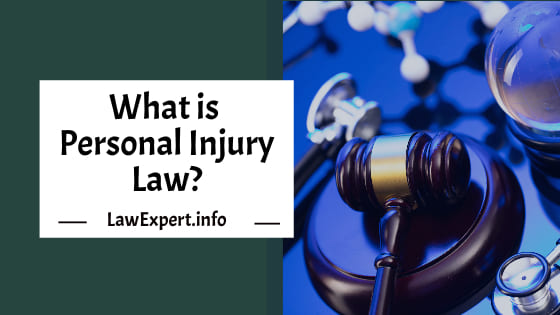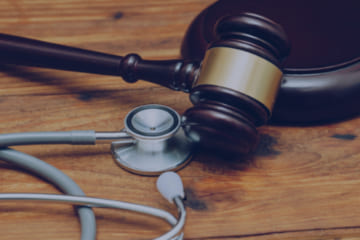What is personal injury law? If you’ve been injured due to someone else’s negligence, you may be wondering what personal injury law is and how it can help you. Personal injury law is a branch of civil law that allows victims of accidents or other injuries to receive compensation for their losses. This includes damages for pain and suffering, lost wages, and medical expenses. If you’ve been injured, a personal injury lawyer can help you file a claim and get the compensation you deserve. Visit our website today to learn more about personal injury law and how we can help you.

What is personal injury law and what does it cover?
Personal injury law is a branch of the law that deals with injuries caused to a person, due to negligence, carelessness, or intentional wrongdoing in action by another. These laws seek to give victims and their families the right to legal remedies in cases of wrongful death, medical malpractice, assault and battery, defective products, etc. Additionally, personal injury may cover anything from physical disorders such as impairments brought on due to exposure to toxins and other forms of environmental pollution. What is personal injury law? Personal injury law seeks to provide redress for persons who have suffered from physical or psychological injuries due to the fault of another. In essence, it is designed so that victims and family members are able to get justice for any harm caused by actions that ought not to have happened in the first place.
Who can file a personal injury lawsuit and what are the requirements for doing so?
Filing a personal injury lawsuit can be an effective way to seek compensation for the harm experienced due to another person’s negligence. Generally speaking, anyone who suffers an injury that could fairly and reasonably have been avoided provided the injured party had taken reasonable care may be eligible to pursue legal action. To bring a successful claim for a personal injury, you must be able to demonstrate that the defendant (the person who caused the accident) was negligent in their behavior, and such negligence was the cause of your injury. In addition, it is important to provide sufficient evidence of how your injury has impacted your life and how much compensation should be awarded via intangible losses such as pain, suffering, disfigurement, or disability that stem from the accident.
Who can file a personal injury lawsuit and what are the requirements for doing so?
Filing a personal injury lawsuit can be an effective way to seek compensation for the harm experienced due to another person’s negligence. Generally speaking, anyone who suffers an injury that could fairly and reasonably have been avoided provided the injured party had taken reasonable care may be eligible to pursue legal action. To bring a successful claim for a personal injury, you must be able to demonstrate that the defendant (the person who caused the accident) was negligent in their behavior, and such negligence was the cause of your injury. In addition, it is important to provide sufficient evidence of how your injury has impacted your life and how much compensation should be awarded via intangible losses such as pain, suffering, disfigurement, or disability that stem from the accident.
How do you prove that someone else is at fault in a personal injury case, and what damages can you recover if you win your case?
Proving that someone else is at fault in a personal injury case can be tricky, and it requires a comprehensive understanding of the laws surrounding this area. Detailed evidence must show that the other party was responsible for your injuries; this includes both direct and circumstantial evidence. Additionally, you must prove causation by demonstrating how the accident was directly caused by the other party’s negligence. If successful, you may be able to recover damages such as medical bills, lost wages, pain and suffering, property damage, or punitive damages. However, rules and regulations for different types of damages vary from state to state. What is personal injury law? A good lawyer can help you understand what types of damages may be available to you in your specific situation.

What are some common defenses to personal injury lawsuits, and how can you overcome them if you're bringing a claim against someone else?
When you are considering bringing a personal injury lawsuit against someone else, it is important to understand that common defenses may be used to challenge your claim. If the person or entity you are suing was unaware of the potential for harm, if they were not negligent or at fault, or if you were injured as the result of assuming a risk or taking part in an activity, these could all be potential considerations when defending a personal injury claim. Other common defenses include the assumption of risk and contributory negligence. To overcome these common defense strategies, it is essential to provide substantial evidence establishing all elements necessary for a successful lawsuit; for example, proving that the person you’re suing owed you a duty, breached this duty through an act of negligence, and caused an actual injury as a result. In addition, if applicable (e.g., when attempting to prove contributory negligence), evidence should also highlight any action on your part that could be interpreted as having contributed to your injury in some way.
What should you do if you've been injured in an accident caused by someone else's negligence or carelessness, and how can an experienced personal injury lawyer help you with your case?
If you have been hurt or injured in an accident due to someone else’s negligence, you must take the necessary steps to receive the full compensation to which you are entitled. Talking with an experienced personal injury lawyer can help immensely; they understand the legal intricacies involved and will be able to assess your case and advise you on what actions need to be taken. An attorney can gather important legal documents, conduct investigations, and represent you throughout the process. They can also assist in determining how much of a settlement you should receive for your injury, and negotiate with opposing parties, such as insurance companies. Taking action with an experienced lawyer could make all the difference in your case.
How do I file a personal injury claim?
Filing a personal injury claim can be an intimidating process, but it is one that many people must go through in order to seek justice. Understanding the nuances of the legal system and insurance policies can be overwhelming, however, there are some helpful steps you can take to make filing a claim more manageable. Start by collecting evidence and documentation that support your cases such as witness testimony, medical records, and police reports. Once you have gathered this material, contact an attorney who has experience with personal injury claims as they will help guide you through the rest of the claim. By following these steps, you’ll be able to build a strong case for yourself so that you receive the compensation you deserve for any pain or suffering resulting from the accident.
When should I contact a personal injury lawyer?
What is personal injury law? After enduring an injury due to the careless or negligent acts of another person, you may choose to pursue a personal injury claim with the help of a lawyer. In order to make sure your legal rights are protected and your claim is successful, you should contact a personal injury lawyer as soon as possible. They are experts when it comes to complex liability laws, processes, and procedures and can provide the guidance needed to ensure you receive due compensation for your suffering or loss. It’s important to be aware that many states have statutes of limitation that determines how long after an accident you can take legal action—so consult with a personal injury attorney sooner rather than later in order to protect yourself.
What types of damages can I receive in a personal injury lawsuit?
If you have been the victim of a personal injury, you may be entitled to receive damages in legal action. Damages can come in many different forms and can be a combination of both economic and non-economic losses. Economic damages, such as loss of income, repayment of medical expenses, and rental or purchase of adaptive equipment may be possible. Non-economic damages are more subjective, such as suffering and distress, rehabilitation costs, pain and suffering, loss of enjoyment, and quality of life. Taking legal action is an important step to recouping any type of compensation that you may be entitled to from an injury caused by another party’s negligence or wrongful act.
How much money can I expect to receive from a personal injury settlement?
When considering a personal injury settlement, there are multiple factors to consider. The total amount of money you can expect to receive is determined by damages suffered from the accident, such as medical bills, lost wages, and pain and suffering. In some cases, it may also take projected future medical expenses into account. Additionally, an insurance company will evaluate contributory negligence to assess the level of liability before providing a settlement offer. Ultimately, the settlement amount can vary greatly depending on the severity of your injuries and other applicable circumstances. Therefore, it is important to research your rights surrounding a personal injury settlement in order to understand what you can expect financially in this situation.
What should I do if I am injured in an accident?
If you have been involved in an accident and have suffered an injury, it is important to seek medical attention immediately. It is also wise to document the accident and any related issues for future reference. Make sure to take pictures of the scene of the accident if you are able, and collect witness information. Remember to keep detailed records of your medical expenses, therapy appointments, treatments sought by doctors, or any other related out-of-pocket costs. Additionally, consulting with an attorney may prove helpful as they can assist in obtaining necessary medical care and/or financial compensation for lost wages or pain and suffering. With careful planning and quick action after an accident, you’ll be able to receive the help that you need while protecting your rights at the same time.
What is personal injury law?
Personal injury law is a complex and ever-changing area of law that covers a wide range of accidents and injuries. If you or someone you love has been injured in an accident, it’s important to understand your legal rights and options. An experienced personal injury lawyer can help you file a personal injury lawsuit, prove that another party is at fault for your injuries, and recover the damages you’re entitled to. The LawExpert – Lawyers directory can help you find a lawyer near me who specializes in criminal defense. Contact the right attorney today for more information or schedule a consultation with one of the best criminal defense attorneys in our directory.



